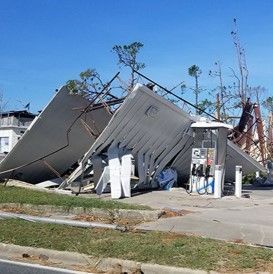Providing food, water and supplies to struggling families in the wake of Hurricane Michael.

Families in the Southeast are struggling in the wake of Hurricane Michael, the most powerful storm on record to hit the Gulf Coast and the second deadly hurricane to hit the region in a few short weeks. The storm caused substantial devastation that will impact communities in Florida and surrounding states for years to come, but the Feeding America network is committed meeting the critical need for meals over the long term. Thanks to the generosity of supporters like you, we will help people rebuild their lives.
What happened
Hurricane Michael made landfall near Mexico Beach, Florida on Wednesday, October 10th as a stronger storm than Hurricane Katrina, which devastated the Gulf Coast in 2005. Just shy of Category 5 strength, Hurricane Michael caused widespread damage in parts of Florida, Georgia, Alabama, the Carolinas, and Virginia. It slammed many communities with powerful wind, rain, and flooding. In areas that were already home to thousands of hungry families, houses were flattened, trees were knocked down, and key services—including power, water, and cell phone reception—were completely cut off.
How we are responding
Feeding America is channeling resources from food banks and donors across the country to impacted communities while also helping people on the ground responding to the disaster. We have shipped 7.5 million pounds of food, water, and emergency supplies to food banks affected by recent disasters, including 1.6 million pounds for Hurricane Michael and 5.9 million pounds for Hurricane Florence. Last week, we traveled to Florida and Georgia to assess storm damage and provide support to food banks.
In Florida, we spoke with a young nursing student whose family had a home in Mexico Beach for 50 years. When they were finally able to reach their property after Hurricane Michael, they found it totally destroyed. Sadly, this is just one of the many tragic stories that people are sharing. Many families are struggling to recover, yet the Feeding America network is ready to help them move forward.
Feeding Florida, Florida’s state association for food banks, is helping food banks across the state share resources and communicating with state officials on behalf of affected food banks. They are leveraging lessons learned during Hurricane Irma last year to access more food for hungry families, children, and seniors.
At the local level, food banks are working hard to provide thousands of meals in hard-hit areas such as Panama City and Mexico Beach. Feeding the Gulf Coast (Theodore, AL) and America’s Second Harvest of the Big Bend (Tallahassee, FL) have distributed 550,000 ready to eat meals (meaning that the meals do not require any preparation or cooking). Additionally, they have provided 158,000 meals from disaster food boxes, 1.6 million bottles of water, 600,000 snacks and 20,000 servings of fresh produce to people in need. In one of the most devastated areas, the parking lot of a closed Kmart is serving as a large-scale disaster distribution point. All day long, people impacted by the hurricane are receiving food, water, and supplies from food banks and other disaster relief organizations who are working together to help the community. In Georgia, Second Harvest of South Georgia (Valdosta, GA) has distributed more than 326,000 pounds of product and produced over 32,000 hot meals for relief workers and people in shelters.
How you can help
We are reaching many hurricane-ravaged communities, but we need your help to get food where it is most needed. Please donate to Feeding America. Donating funds is the most efficient, cost-effective, environmentally friendly way to help people affected by the disaster. Food drives, by contrast, can be costly and require manpower to sort or deliver food. Your gift will enable food banks in devastated areas to obtain the resources they need to fill empty hands and stomachs, providing hope to families who have lost everything.

